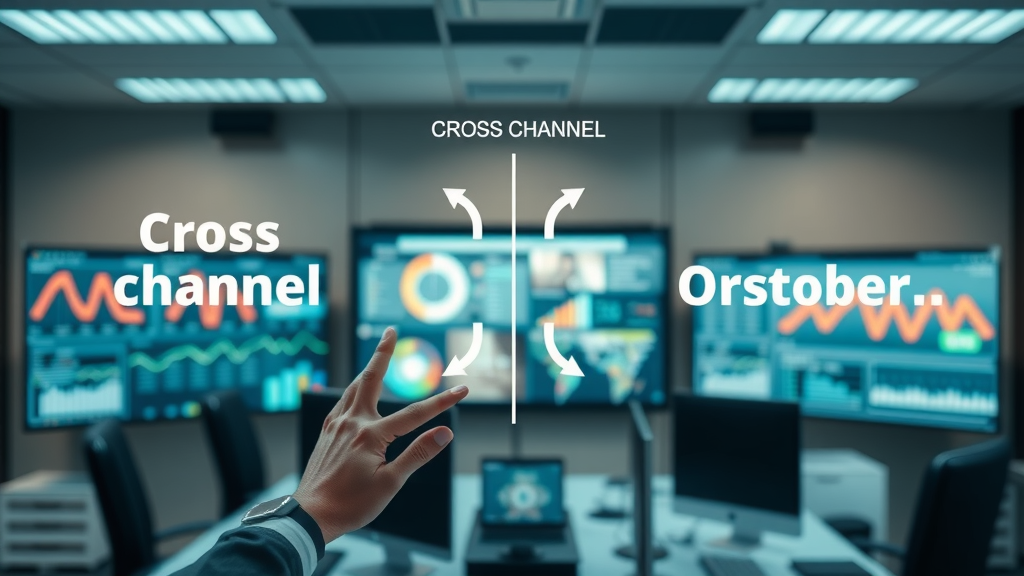Did you know: According to recent data, small businesses deploying effective cross-channel marketing solutions can see up to 300% higher engagement and a 35% increase in conversion rates compared to those using a single platform? If you’re a small business owner, mastering cross-channel strategies isn’t a luxury—it’s a proven route to unlocking growth, maximizing your marketing efforts, and connecting with your target audience where it matters most.

Cross-channel Marketing Solutions for Small Business Owners: A Game-Changer in Modern Marketing
In today’s fast-paced digital ecosystem, the ability to integrate and manage marketing efforts across multiple channels is a true game-changer for small business owners. Cross-channel marketing solutions empower you to coordinate campaigns, streamline messaging, and reach your target audience on social media, email, and more—without spreading resources too thin. The real benefit? Delivering a seamless customer journey that follows prospects from their first touchpoint through to conversion and advocacy. By strategically leveraging a mix of social media, email marketing, and other digital platforms, small businesses not only engage more effectively but also build the trust and brand awareness needed in today’s crowded marketplace. Let's dive into the tools and strategies that make this all possible.
Opening Hook: Surprising Statistics About Channel Marketing and Small Businesses
A recent survey showed that 72% of small businesses utilizing a cross-channel marketing platform reported significant improvements in customer experience and overall revenue compared to those operating on siloed channels. Even more striking, businesses that integrated at least three marketing channels witnessed a 287% higher purchase rate than those using a single channel. This highlights how small businesses embracing channel marketing strategies are not only surviving but thriving, redefining what's possible with the right marketing tools and efforts.

What You'll Learn in This Guide to Cross-channel Marketing Solutions for Small Business Owners
Understand the foundations of cross-channel marketing solutions for small business owners
Compare cross-channel, multi-channel, and omnichannel marketing strategies
Discover top marketing platforms and tools for small businesses
Learn how to increase conversion rates with integrated marketing campaigns
Access expert advice on media management, social media management, and marketing automation
The Essentials of Cross-channel Marketing Solutions for Small Business Owners
Defining Channel Marketing and Its Impact on Small Business Growth
Channel marketing is the strategic use of multiple marketing channels—such as social media, email, and online advertising—to connect with customers at various touchpoints along their buying journey. For small business owners, this means being present where your customers are and maintaining consistent messaging as they move from platform to platform. When executed properly, using channel marketing solutions doesn’t just increase brand awareness; it helps collect meaningful customer data to inform future strategies and boosts the conversion rates you need for sustainable growth. In a landscape where competition is fierce, the ability to deploy cross-channel marketing efforts sets leading small businesses apart.
How Small Businesses and Small Business Owners Benefit from Cross-channel Marketing Solutions
The advantages of cross-channel marketing solutions extend well beyond visibility. Small businesses can more accurately target and engage their customers with personalized messaging—thanks to integrated customer data platforms that break down silos between social media, email marketing, and ecommerce. This opens the door for nurturing leads with timely, relevant content and tracking each prospect’s journey toward conversion. Importantly, these strategies dramatically improve marketing efficiency, letting small business owners do more with less and ensuring every marketing dollar is put to its best use through improved media management and campaign reporting.
Key Elements: Social Media, Marketing Platform, and Channel Marketing Strategy
To succeed, every small business should focus on three core elements: a robust social media presence, the right marketing platform for campaign management, and a holistic channel marketing strategy. Social media management tools allow you to plan and automate posts, engage with your audience in real-time, and analyze performance, while marketing automation platforms streamline email campaigns, ad placements, and CRM workflows. Combining these elements into an integrated channel marketing strategy ensures that your messaging remains consistent and your marketing efforts are aligned with larger business goals.

“Integrated channel marketing solutions have transformed our ability to reach and serve our target audience with consistency across all platforms and touchpoints.” – Small Business Marketing Expert
Understanding Cross-channel vs. Multichannel and Omnichannel Marketing Strategies
Comparison of Cross-channel, Multichannel, and Omnichannel Marketing for Small Businesses (Channels Used, Customer Experience, Data Integration, Marketing Effort Required)
Understanding the differences between multichannel, cross-channel, and omnichannel marketing is key for small businesses looking to maximize marketing efforts. Multichannel marketing uses several separate platforms (like email, social, and web), but often with little integration between them. Cross-channel marketing solutions for small business owners sync up these channels, sharing customer data and messaging to create a seamless experience as your prospects move from one touchpoint to another. Omnichannel, on the other hand, elevates this coordination, ensuring not only that messaging is consistent, but that every channel (including in-store) is unified for an integrated customer journey. The following table explains the key distinctions:

Strategy |
Channels Used |
Customer Experience |
Data Integration |
Marketing Effort |
|---|---|---|---|---|
Multichannel |
Email, Social Media, Website (operated separately) |
Disconnected—messaging may differ by channel |
Minimal |
Medium |
Cross-channel |
Email, Social Media, Website (coordinated) |
Seamless experience—channels work together |
Moderate |
Efficient |
Omnichannel |
All digital and physical channels unified |
Fully unified—one integrated journey |
High |
High |
Benefits of Cross-channel Marketing Solutions for Small Business Owners
Cross-channel marketing solutions offer a sweet spot for small business owners—providing the integration needed for higher conversion rates and better customer journeys, without the complexity of full-scale omnichannel execution. Businesses enjoy the ability to track user interactions, retarget customers seamlessly across platforms, and maximize ROI from each marketing campaign. For many, the real transformation lies in improved media management and efficiency: campaign assets, performance data, and brand messaging work harmoniously, letting small businesses make informed, data-driven decisions and foster enduring relationships with their audience.
Seamless customer experience across platformsEnhanced customer journey tracking through customer dataImproved conversion rates via integrated marketing effortsEfficient media management
How to Design an Effective Channel Marketing Strategy for Small Businesses
Step 1: Leveraging Customer Data for a Targeted Marketing Strategy
The first step in drafting a winning channel marketing strategy is to leverage the customer data you already collect. This includes tracking behaviors, purchase patterns, and interactions across every touchpoint—whether it’s your website, social media, or in-store visits. Using a unified data platform, small business owners can segment their audience, deliver more relevant content, and anticipate customer needs. This data-driven approach ensures that marketing efforts aren’t wasted on generic messaging but instead create the precise, targeted impact essential for growth.

Step 2: Selecting the Right Marketing Platform and Marketing Tools
Choosing the right marketing platform and marketing tools is crucial for facilitating effective cross-channel marketing solutions for small business owners. Leading platforms like HubSpot, Hootsuite, and Mailchimp offer integrations for social media, email, automation, and analytics, giving you what you need to manage campaigns holistically. Evaluate prospective tools based on their ability to automate tasks, unify contact data, and report results in ways that are actionable—not just informational. Investing in marketing automation minimizes resource waste, centralizes your campaign management, and equips your small business for scalable marketing success.
Step 3: Implementing Social Media Management and Media Management
Social media management goes hand-in-hand with media management to ensure that your small business’s voice remains consistent and active across multiple channels. Tools like Buffer and Zoho Campaigns help automate posts, monitor engagement, and analyze trends in your marketing efforts. Media management adds another layer by organizing visual assets, ad creatives, and brand guidelines, so your channel marketing strategy maintains quality and recognizability—regardless of platform. Combining these approaches streamlines both the day-to-day and big-picture aspects of cross-channel marketing, putting control into the hands of small business owners.

Step 4: Setting Clear Goals for Your Marketing Campaigns and Tracking Performance
Every successful marketing strategy is anchored by clear goals and robust performance tracking. Define your desired outcomes—whether it’s new lead generation, boosting conversion rates, or increasing repeat purchases—and align your channel marketing activities accordingly. Track key metrics such as engagement, click-through rates, customer acquisition cost, and overall ROI using the reporting dashboards included with many marketing tools. This not only shows which efforts are working, but also where to optimize your future marketing campaigns for even better results.
"A data-driven channel marketing strategy is the backbone of successful small business growth in the digital age." – Leading Digital Marketing Consultant
Top Cross-channel Marketing Platforms and Tools for Small Business Owners
Comparing Marketing Automation Solutions and Media Management Tools
A host of marketing automation solutions are designed specifically to meet the needs of small businesses, each offering integrated tools for campaign management, scheduling, analytics, and content distribution. Hootsuite and Buffer excel at cross-channel social media scheduling and reporting; HubSpot and Mailchimp provide robust automation for email campaigns plus CRM functionality. Meanwhile, media management platforms help small businesses organize all campaign collateral for quick access and brand consistency. Carefully compare features, pricing, and scalability to pick solutions that align with your current and future marketing efforts.

Utilizing Social Media Marketing Platforms for Small Businesses
Social media platforms remain a cornerstone for cross-channel marketing solutions for small business owners. Tools like Buffer and Hootsuite make it easy to manage multiple platforms simultaneously, schedule posts in advance, and interact with your target audience in real-time. These platforms provide vital analytics for measuring what content resonates, informing your next round of marketing campaigns. Consistency in posting and prompt engagement are the hallmarks of a channel marketing strategy that truly works for small business growth.
How Marketing Efforts Can Be Streamlined for Optimal Results
Cross-channel marketing solutions simplify what can otherwise be a daunting set of marketing efforts for small businesses. By integrating communications and customer data, business owners reduce redundancy, avoid conflicting brand messages, and ensure that every touchpoint delivers value. Centralized management tools, automated campaigns, and synchronized reporting are all part of the formula, making it easier than ever to scale your marketing strategy in a results-oriented way.
Popular marketing tools for cross-channel marketing solutions: Hootsuite, HubSpot, Mailchimp, Buffer, Zoho Campaigns
Hootsuite: Advanced social media management and scheduling
HubSpot: All-in-one CRM, email marketing, and automation
Mailchimp: Cost-effective email marketing and automation
Buffer: Intuitive platform for cross-channel social media posting
Zoho Campaigns: Affordable solution for email automation and reporting
Optimizing the Customer Journey with Cross-channel Marketing Solutions for Small Business Owners
Why Customer Experience Matters in Channel Marketing
Customer experience is central to every channel marketing strategy. In today’s landscape, small business owners can no longer afford disjointed marketing efforts that leave prospects confused or disengaged. Cross-channel marketing solutions empower you to deliver a seamless, positive experience across every platform—keeping messaging, branding, and service consistent. This approach not only builds customer loyalty but also encourages repeat business and referrals. Investing in customer data integration and automation ensures every interaction feels tailored, timely, and relevant.

Building a Seamless Experience Across Multiple Channels
A seamless customer experience means your brand looks, sounds, and provides value in a consistent way, no matter where or how your customer interacts—website, social media, email, or in person. Achieving this requires integrating your marketing tools, unifying your messaging, and aligning your team behind a common channel marketing strategy. Technology and training work together: automation platforms handle repetitive tasks, while a clear brand style guide ensures your voice is unmistakable across all channels.
Harnessing Customer Data to Personalize Marketing Campaigns
Personalization is a game changer in cross-channel marketing solutions for small business owners. By collecting and analyzing customer data from every interaction, you can tailor content, promotions, and outreach efforts to each specific audience segment. From sending targeted emails based on previous purchases to retargeting website visitors with social media ads, this approach increases relevance, improves conversion rates, and makes your marketing campaigns stand out—no matter how crowded your niche.
"Delivering a seamless customer journey across multiple channels is no longer a luxury—it's a necessity for small business success." – Omnichannel Marketing Thought Leader
Case Studies: Real-world Cross-channel Marketing Strategies in Small Businesses
How a Small Retailer Elevated Their Marketing Campaigns with Social Media and Email Marketing
A boutique clothing retailer implemented a cross-channel marketing solution by integrating their website, email campaigns, and social media. After tracking customer data, they segmented their audience into frequent buyers, occasional shoppers, and new prospects. Targeted email marketing was coupled with Instagram and Facebook retargeting ads, resulting in personalized content delivery and seamless purchasing journeys. The outcome? The retailer saw a 160% increase in online sales and a significant boost in in-store foot traffic, all thanks to coordinated marketing efforts.

Service-based Small Businesses: Improving Conversion Rates with Integrated Marketing Efforts
A local cleaning service leveraged cross-channel marketing solutions by using email newsletters, Google Ads, and Facebook campaigns all managed from a single marketing platform. By synchronizing messaging and timing—responding to customer inquiries via social media then following up with promotional emails—they improved their booking conversion rates by 40%. The lesson for small business owners is clear: integrating customer touchpoints across multiple channels not only shortens the sales cycle but also increases overall marketing ROI.
Watch our video to see real-world cross-channel marketing solutions in action: from interviews with successful small business owners to animated breakdowns of how campaigns are coordinated across platforms. Discover firsthand how these strategies are changing the game for small businesses everywhere.
People Also Ask: Cross-channel Marketing Solutions for Small Business Owners
What company uses multichannel marketing?
Answer: Numerous leading companies such as Amazon, Nike, and Starbucks implement multichannel marketing, providing consistent customer experiences across in-store, online, and mobile channels. Their ability to integrate messaging across platforms demonstrates the benefits of channel marketing solutions that small business owners can adapt at scale.
What is the difference between multichannel and cross-channel marketing?
Answer: Multichannel marketing uses several platforms independently, while cross-channel marketing solutions for small business owners ensure channels work together for a seamless experience. Cross-channel integrates customer data for cohesive marketing efforts, optimizing the customer journey.
What is an example of a cross-channel strategy?
Answer: An example is a small business sending a promotional email (email marketing), then retargeting respondents on social media, and capturing conversions on their website—all touchpoints coordinated using cross-channel marketing solutions for small business owners.
What is the difference between crosschannel and omnichannel?
Answer: While both focus on integrating marketing efforts, cross-channel refers to coordinated campaigns across select channels; omnichannel ensures an entirely unified experience across all possible channels and touchpoints for small business customers.
FAQs: Cross-channel Marketing Solutions for Small Business Owners
How much does it cost to start cross-channel marketing for small businesses?
Starting costs for cross-channel marketing solutions can vary widely based on your choice of marketing tools and platforms. Basic social media management or email marketing platforms can start at $10-30/month, with full-featured automation suites—like HubSpot or Zoho Campaigns—ranging from $50 to several hundred dollars per month. Think of these investments as drivers of efficiency, enabling your small business to centralize and optimize its marketing strategy from day one.
Which marketing tools are best for multi-platform campaigns?
Hootsuite, HubSpot, and Buffer are excellent options for small businesses looking to manage social media, email, and digital marketing all in one place. For more advanced automation and analytics, Mailchimp and Zoho Campaigns offer seamless integration with other platforms, supporting sophisticated cross-channel marketing efforts without the enterprise price tag.
Can I implement cross-channel marketing solutions without prior experience?
Absolutely. Many marketing platforms are designed for beginners and small business owners, offering tutorials, templates, and intuitive setups. Start with one or two channels and grow from there as you build confidence and see results—the sooner you integrate your marketing efforts, the sooner you’ll benefit from a seamless, data-driven approach.
Key Takeaways: Maximizing Results with Cross-channel Marketing Solutions for Small Business Owners
Cross-channel marketing solutions empower small business owners to streamline marketing efforts
Integrating email marketing, social media, and data analytics delivers better customer journeys
Small businesses must leverage the right marketing tools and platforms for growth
Data-driven marketing strategies drive higher conversion rates
Conclusion: Next Steps for Implementing Cross-channel Marketing Solutions for Small Business Owners
A consultative wrap-up with actionable recommendations to guide small business owners in launching or optimizing channel marketing strategies and adopting the best marketing platforms toward continual growth.
See actionable, content-first strategies that unify your marketing channels—in one step-by-step video guide designed specifically for small business owners.
Take Action: Start Your Cross-channel Marketing Transformation Now
Marketing Just Limping Along? Would you like your strategies to Work Together Seamlessly and Effectively? Click this link to Download the “The Ultimate Small Business Cross-Channel Marketing Checklist” at this link https://bit.ly/cross-channel-checklist
For more information, visit our online marketing magazine "Effective Marketing Strategies" at https://viployalty-oki.us/
Sources
To enhance your understanding of cross-channel marketing solutions for small business owners, consider exploring the following resources:
“Cross-Channel Marketing Can Transform Your Small Business — Here’s How to Build a Winning Strategy”: This article from Entrepreneur provides insights into how cross-channel marketing can boost sales and improve customer engagement for small businesses. It emphasizes the importance of centralizing customer data and implementing marketing automation to streamline efforts. (entrepreneur.com)
“Cross-Channel Marketing: Tips + Examples to Drive Your Strategy”: Published by InboxArmy, this piece offers practical tips and real-world examples of successful cross-channel marketing campaigns. It highlights how businesses like Domino’s Pizza have effectively integrated multiple channels to enhance customer experience. (inboxarmy.com)
These resources provide actionable strategies and case studies to help you implement effective cross-channel marketing solutions tailored to your small business needs.
 Add Row
Add Row  Add
Add 




Write A Comment